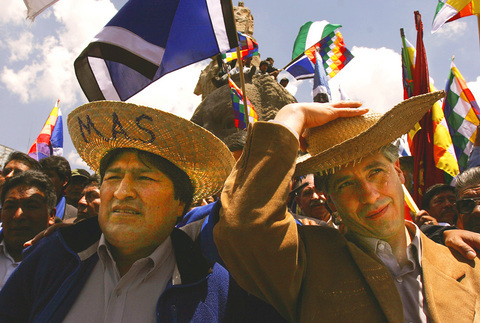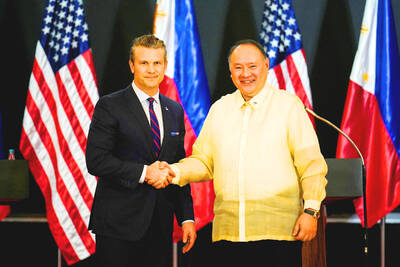The coca farmers on these steep mountain slopes have long felt their livelihood and Indian identity threatened by US-backed efforts to uproot the crop that makes cocaine.
Now they are pinning their hopes on one of their own -- an Indian coca farmer who is also the front-runner for the presidency.
Evo Morales promises that if elected on Dec. 4, he will decriminalize all coca farming. That would mean an end to a decade-old crop eradication program that has led to clashes between farmers and soldiers in which dozens have died.

PHOTO: AP
He would also be Bolivia's first Indian president, and his leftist politics -- he's a close friend of Venezuelan President Hugo Chavez -- would move yet another Latin American government leftward after Brazil, Argentina, Chile and Uruguay.
A Morales victory may worry Washington, as well as many governments in Europe, Bolivian cocaine's chief market. But the cocaleros, as coca farmers are known, are delighted at the prospect.
"Many Indians are very hopeful that these elections can change history," said Issaes Alvarez, a 23-year-old cocalero and town councilor in Asunta, in a coca-growing region northeast of La Paz, the capital. "If the eradication continues there will be a massacre, there will be death, there will be violations of human rights."
Indians are the majority in this nation of 8.5 million, and for centuries, those in the Andean highlands have chewed the coca leaf to stave off hunger pangs and work up energy, used it in religious ceremonies and boiled it into medicinal tea. It's sold legally in supermarkets throughout Bolivia and Peru, and is served as tea in cafes.
But coca is also the main ingredient of cocaine, and the Bolivian and US governments are convinced that a growing amount of the crop is being turned into drugs. Bolivia, the world's No. 3 coca power after Colombia and Peru, produced up to 106.2 tonnes of cocaine last year, up 35 percent from 2003, according to the latest UN World Drug Report.
Morales' family is one of many who migrated from Bolivia's poor western highlands, where they struggled along by herding llamas and growing potatoes. In the tropical Chapare region, in southeast Bolivia, Morales began growing coca, became a trade union official and finally, in 1993, president of the cocalero organization. He still operates a coca farm.
Chapare is his power base, and it was here that he led the often violent clashes with government forces over coca eradication. He was elected to Congress in 1997 and narrowly lost the presidential race to Gonzalo Sanchez de Lozada in 2002. He was a key figure in protests that brought down Sanchez de Lozada in 2003 and his successor, Carlos Mesa, in June.
Opinion polls give him a slight edge over conservative former president Jorge Quiroga.
In the last election, then US Ambassador Manuel Rocha criticized Morales, only to see him shoot up in the polls. Morales jokingly called Rocha his "campaign chief." This time Washington has kept silent about the election, but Morales has said plenty about Washington.
"Thanks to coca, we've made it through the endless suffering caused by the white man's infamous war on drugs," he wrote on his Web site.
But meanwhile, the laborious work of pulling out plants by hand continues. Last year, troops uprooted 8,320 hectares in Chapare -- 83 percent of the total.
Los Yungas, about 480km away, is the only region where growing is legal. The government lets cocaleros farm 11,840 hectares, but the UN Illicit Crop Monitoring Program estimates that an additional 5,200 hectares are planted. The hillsides of Asunta, for example, are an endless patchwork of illegal green coca bushes.
Now the government is eyeing Los Yungas too. Next month it will begin paying some farmers to destroy their plants and encourage them to switch crops voluntarily. But although authorities promise there'll be no uprooting by force, tempers are running high. After the army enlarged a checkpoint to track illegal drugs out of Los Yungas, cocaleros threatened a blockade, fearing eradication was coming.
Farmers say alternative crops such as coffee and bananas are harder to grow and transport, and fetch a lower price. They are staking their hopes on Morales.
"We're not going to let up. We'll keep fighting no matter what the consequences, because there's no other product that sustains us like coca," said Asunta farmer Juan Condori. "It's the only crop that supports the whole family."

‘EYE FOR AN EYE’: Two of the men were shot by a male relative of the victims, whose families turned down the opportunity to offer them amnesty, the Supreme Court said Four men were yesterday publicly executed in Afghanistan, the Supreme Court said, the highest number of executions to be carried out in one day since the Taliban’s return to power. The executions in three separate provinces brought to 10 the number of men publicly put to death since 2021, according to an Agence France-Presse tally. Public executions were common during the Taliban’s first rule from 1996 to 2001, with most of them carried out publicly in sports stadiums. Two men were shot around six or seven times by a male relative of the victims in front of spectators in Qala-i-Naw, the center

Incumbent Ecuadoran President Daniel Noboa on Sunday claimed a runaway victory in the nation’s presidential election, after voters endorsed the young leader’s “iron fist” approach to rampant cartel violence. With more than 90 percent of the votes counted, the National Election Council said Noboa had an unassailable 12-point lead over his leftist rival Luisa Gonzalez. Official results showed Noboa with 56 percent of the vote, against Gonzalez’s 44 percent — a far bigger winning margin than expected after a virtual tie in the first round. Speaking to jubilant supporters in his hometown of Olon, the 37-year-old president claimed a “historic victory.” “A huge hug

Two Belgian teenagers on Tuesday were charged with wildlife piracy after they were found with thousands of ants packed in test tubes in what Kenyan authorities said was part of a trend in trafficking smaller and lesser-known species. Lornoy David and Seppe Lodewijckx, two 19-year-olds who were arrested on April 5 with 5,000 ants at a guest house, appeared distraught during their appearance before a magistrate in Nairobi and were comforted in the courtroom by relatives. They told the magistrate that they were collecting the ants for fun and did not know that it was illegal. In a separate criminal case, Kenyan Dennis

The US will help bolster the Philippines’ arsenal and step up joint military exercises, Manila’s defense chief said, as tensions between Washington and China escalate. The longtime US ally is expecting a sustained US$500 million in annual defense funding from Washington through 2029 to boost its military capabilities and deter China’s “aggression” in the region, Philippine Secretary of Defense Gilberto Teodoro said in an interview in Manila on Thursday. “It is a no-brainer for anybody, because of the aggressive behavior of China,” Teodoro said on close military ties with the US under President Donald Trump. “The efforts for deterrence, for joint resilience